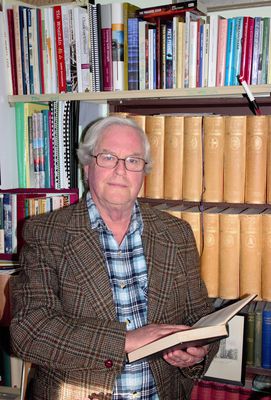
His journalism has seen him contribute over twelve hundred articles, dealing with human interest, feature work and news reporting, to numerous newspapers and magazines state-wide, nation-wide and overseas. He was also a trade reporter, including medical reporting. He had regularly contributed to the Sydney trade publishing Houses, Yaffa , Business Press and Reed Publishing.
DISTINCTIONS
He has several distinctions such as being mentioned in Debrett’s “Who’s Who in Australia”, “Thorpe’s “Who’s Who in Australian Writers”. He is also mentioned in “International Authors and Writer’s Who’s Who” (Cambridge); “Who’s Who in Australasia and Pacific” (Cambridge); “Five hundred leaders of Influence ” 1997 (American Biographical Institute Inc); “Who’s Who in the 21st Century” (Cambridge); and “Man of Achievement Award 2002.” He was often a guest on local television and radio (September 2022- 585 times – all logged) and speaker to various clubs and functions. Honorary Member Tasmanian Military & Historical Society. Life Member of the Australian British Society.
Given the extensive research Reg has undertaken his work is often cited in other authors works. The following is a list of citations that Reg is aware of.
References citing the work of Reg Watson (PDF)
OFFICES HELD
Reg was also a keen political observer and followed current affairs with great interest. A great believer in heritage and patriotism he was President and Founder of the heritage group, The Anglo-Keltic Society (TAK) as he was of the Tasmanian Branch of the Australian National Flag Association (ANFA). Other responsibilities include, Member of The Naval, Military and Air Force Club of Tasmania Inc; Member Royal Australian Air Force Association, Tasmanian Convenor for Australians for Constitutional Monarchy; delegate to the United Commonwealth Societies, Past President of the Hobart Town (1804) First Settlers Association. (Ticket holder number 2), member of the Lindisfarne Historical Society, member Parramatta and District Historic Society and The Glamorgan & District Historical Society. As an historian he was also a member of the Boer War Study Group, Royal Australian Artillery Association of Tasmania, (Historical Wing), member of the Soldiers Walk (Hobart), a “Friend” of Legacy and a member of Lindisfarne Returned Service Club in southern Tasmania, The Lindisfarne Motor Boat Club, Committee member of the Tasmanian Tobruk Association and “Friend” of the Allport Library.
PERSONAL HERITAGE
His late father, Reginald Gordon Watson, was a Rats of Tobruk man, his grandfather, Frederick Wentworth Watson, a Trooper of the Second Tasmanian Bushmen, (2TIB), Boer War. Three members of his family gave their lives during World War One. His mother was the late Ann Alma, nee Payne. He has four daughters, Kylie, Kate, Elspeth (Elly), Grace and thirteen grand children. An ancestor was H.B. Marriott Watson, a famous writer in England.
Living on the eastern-shore area not far from the centre of Hobart, capital of Tasmania, he lived all his life in the island State. He was a 6th generation Tasmanian and a 7th generation Australian. An ancestor, Richard Morgan, arrived with the First Fleet in 1788 while another, John Wade, arrived in Tasmania at Sullivan’s Cove, under David Collins (the first permanent British settlement of Tasmania) in 1804. The first WATSON of his line arrived in Van Diemen’s Land (Tasmania) in 1824 by the name of Brereton Ross Porter Pemberton Rolla Watson, a Naval Lieutenant in the East India Company.
A strong believer in autonomy for Tasmania he has stated that he refers to himself as a “Tasmanian Australian” and has studied and had published and lectured on Secession for Tasmania or what he prefers to call, “Independence for Tasmania”. He has studied and had work published on the Tasmanian State Flag, material of which has been accepted by the Australian Government publication “Australian Flags”.
One of Reg’s projects was to remind Tasmanians of their British heritage and the impact it still has on modern society. Reg has also written on the life John Bowen RN founder of Tasmania.
RECREATION
For recreation he was a keen fisherman, hunter and once a fencer in foil, epee and sabre. He refered to himself as UFOologist, Ripperologist (Jack the Ripper). He was a lover of books, collector of stamps, coins, bank notes. antiques and First-Day covers. A great reader, his main concerns were with the literature classics, history and conservative political material. A great believer in the concept that “one can tell a man by the books ” he collected mainly quality hard-cover material. As for music he loved all kinds, but “heavy metal, rap and hard rock were out” which he described as “primitive”. With art, traditional styles are best, with little appreciation of what is termed, “modern”. While enjoying live theatre, he found a great deal of what is offered in today’s society in the form of entertainment as “unacceptable”. Describing himself as a “conservative, reserved person,” his heroes were T.E. Lawrence (Lawrence of Arabia), Malcolm Muggeridge and Elbert Hubbard (“The writer is great whom you alternatively love and hate. That writer is great whom you cannot forget.”), Dr. Thomas Arnold (“Do consider the immense strength of that single verse, ‘Let every man be fully persuaded in his own mind”) and Alex Solzhenitsyn. Favourite writer, Oscar Wilde.
BOER WAR COMMEMORATIVE DAY
Reg was the originator and organiser of the annual above-mentioned event. This was the first of its kind in Australia. It was held annually in the first week in June in Hobart and the third Sunday in Launceston. It highlighted Tasmania’s involvement in the Anglo-Boer War (1899-1902). Held both in Hobart and in Launceston.
CONCLUSION
He worked from his home “Rockingham”, which he named it after the WATSON ancestral Castle of Rockingham (Rutland, England). You can contact the web administrator by email on reg@regwatson.com. Please inquire re availability of his publications by email.
